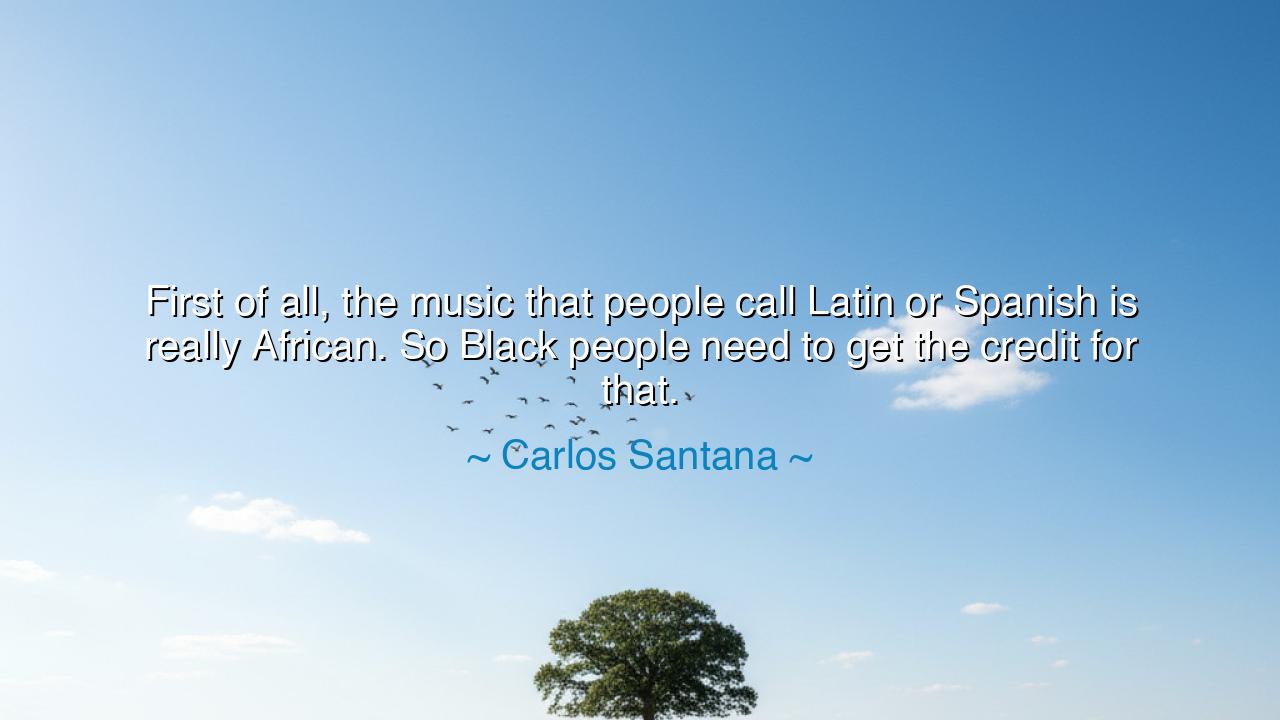
First of all, the music that people call Latin or Spanish is
First of all, the music that people call Latin or Spanish is really African. So Black people need to get the credit for that.






Carlos Santana, the fiery prophet of strings, once declared: “First of all, the music that people call Latin or Spanish is really African. So Black people need to get the credit for that.” These words pierce through illusion, cutting away the veil of misnaming and forgetting. They remind us that beneath the bright rhythms of salsa, samba, rumba, flamenco, and all the dances of the so-called Latin world, there beats an older heart—the heartbeat of Africa. Santana calls us to remembrance: the soul of this music was born in the suffering and strength of a people torn from their homeland, yet never stripped of their rhythm.
For what is Latin music without the drum? What is the flamenco guitar without the cry of African call-and-response? What is the dance of the Caribbean without the syncopated beat of the djembe, the conga, the talking drum? The colonizers brought chains and ships, but the enslaved brought music, and from their sorrow bloomed a joy that could not be killed. In the face of cruelty, they lifted rhythm as a shield, as a sword, as a sanctuary. This truth, Santana says, must never be denied, for to deny it is to erase both pain and triumph.
History confirms his words. When Africans were taken to the Americas, they carried not possessions, but memory—memory woven into music. In Cuba, their rhythms fused with Spanish guitars to form the son and the rumba. In Brazil, the beats of Africa joined with Portuguese and Indigenous sounds to birth samba and bossa nova. In the United States, the same roots grew into jazz, blues, and gospel. The African spirit, though shackled, reshaped the world’s sound. Without it, there would be no so-called “Latin” music, no modern popular song, no heartbeat to move nations.
Think of the story of Ignacio Piñeiro of Cuba, who created the rumba that lit Havana with life. Or consider Celia Cruz, the “Queen of Salsa,” whose power came from rhythms rooted deep in Africa. Their art was not isolated brilliance—it was the flowering of seeds sown generations earlier by the enslaved, who drummed in secret, who sang in the night, who refused to let their heritage be silenced. They are the unseen architects of what the world now celebrates as Latin music. Santana’s call is for justice: let the builders be named, let the true origin be honored.
The ancients taught that truth must always be spoken, even if it shakes the pillars of pride. Santana speaks in that spirit, reminding us that the gift of music cannot be separated from the people who birthed it. To give credit is not charity—it is righteousness. To name Black people as the origin of these rhythms is to heal the wound of erasure, to honor the ancestors who endured chains yet left the world a legacy of joy. For they gave us not only survival, but beauty, and that beauty transformed every continent it touched.
The lesson for you, listener, is this: when you hear a rhythm, ask of its roots. Do not consume music thoughtlessly, as if it sprang from nowhere. Know its story, honor its people, give credit where credit is due. In doing so, you show reverence not only for the art but for the human spirit that carried it through oppression to glory. Music is more than sound—it is history sung aloud, memory set to beat.
Practical wisdom follows: when you celebrate salsa or samba, when you sway to flamenco or jazz, remember to speak of Africa. Teach your children the true origins. Support the artists who carry that heritage forward. And most of all, let the rhythms remind you that beauty can be born even from suffering, and that no chains can silence the voice of the human soul.
So let Santana’s words echo as a law of truth: “The music that people call Latin or Spanish is really African.” Speak it, share it, live it. For in honoring the true roots, you not only give credit to the past—you also plant seeds of justice for the future. And the world, built upon honesty, will find its rhythm purer, stronger, and everlasting.






AAdministratorAdministrator
Welcome, honored guests. Please leave a comment, we will respond soon